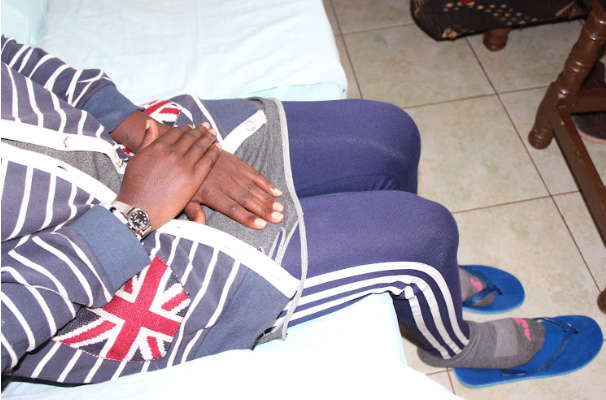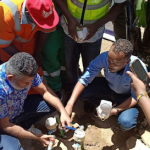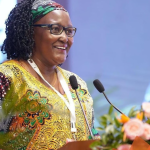Five-year old Maria (not real name) was playing with friends near her home in Mvita sub county, Mombasa county, when a man who lived in the neighbourhood called her.
The brother to Maria’s schoolmates took her hand and led her to his house and into a room, where he undressed her and inserted a stone that had been smeared with cream into her private parts.
He then dressed her up and warned Maria against telling her parents about the incident. But when she went back home, her nanny realised she experienced pain while passing urine and her underwear was dirty.
A medical examination in a local clinic confirmed that she had been sexually violated.
Maria’s mother took her to a police station and reported. The suspect was arrested.
Maria identified him in a parade.He was charged with sexually assaulting a minor and committing an indecent act.
The man denied the charges but the court found him guilty as the child had positively identified him.
Maria’s case is one of the many child sexual offences at the Coast that are raising concern.
Benjamin Rop, the head of Violence Against Women and Children programme under the International Justice Mission, said a survey conducted in 2021 revealed over 7,000 unreported cases of sex molestation of children in the region.
The survey conducted in partnership with the Global Fund to End Modern Slavery focused on Kilifi, Kwale and Mombasa counties.
Most members of communities don’t report cases due to lack of faith in the justice system while others traffic their children for money.
“Some people did not know that they could report cases and how to go about it, while other cases were handled through kangaroo courts. Cases involving sexual molestation of children should not go through alternative justice systems and should be prosecuted in court,” Rop said.
IJM is working with state and non-state agencies to build trust of communities in the criminal justice system.
This is done through capacity building of journalists, police officers and prosecutors on trauma, informed care of survivors and how to conduct proper investigations.
Rop spoke during a journalists’ training forum organised by IJM in Kwale. The organisation has received 50 cases of trafficking for sex. Five have been concluded in court with four convictions and one acquittal.
“We have a programme in which survivors are counselled and continuous assessments indicate that they undergo major improvement”.
Principal magistrate Lilian Lewa, the head of station at Kwale law courts, said cases of child molestation have skyrocketed since she was posted there in 2021.
Lewa cited Lunga Lunga subcounty, where fathers and grandfathers start grooming daughters and nieces early.
“They start calling them ‘wife’ and eventually start molesting them and this has resulted in many cases of early pregnancy.”
Owing to high illiteracy, many girls don’t know their rights and are susceptible to exploitation, while the poor infrastructural development discourages many from reporting cases of sexual assault and encourages the sex trade.
Girls who fall victim are subjected to social stigma and in some instances have to be relocated when they are rescued.
Lewa said challenges such as witness interference, poor investigations, inadequate support for victims, insufficient safe houses and lack of awareness have further aggravated the fight against sexual abuse.
Msambweni children’s officer Johnstone Kivuli handles one to three cases weekly.
“These are only the cases that get reported. Many more are unreported,” he said.
He said child abandonment fuels sexual offences as parents leave their children under the care of relatives or friends in search of greener pastures.
Emmanuel Tendet, a child protection specialist in the Directorate of Children Services, said Kilifi county recorded 181 defilement cases last year, Kwale had 65, Mombasa 97 and Taita Taveta 33.
Incest cases reported in children’s office were 13 in Kilifi, three in Kwale, four in Mombasa, one in Taita Taveta. None was reported in Tana River.
But with neglect causing the bulk of cases in the region, Tendet said the directorate is implementing care reforms to move abandoned children from charitable organisations into the community through guardianship and adoption in 10 years.
“In transitioning them, we will have to work with non-state actors and the media to change Kenyans’ perception, so that orphans don’t have to be sent to orphanages yet they have relatives,” he said.
Directorate of Public Prosecutions Coast region coordinator Peter Kiprop said 763 cases of defilement were registered in the region last year.
This year, 511 cases have been handled from January to September while 399 are pending in court.
Mueni Mutisya, the head of Anti-Human Trafficking and Child Protection Unit, said high poverty levels in the region cause parents to give away their children to tourists for money.
Mutisya said there is a growing number of boys who are victims of online child sexual exploitation and abuse.
In 2019, the unit established a forensic section specialised in online child sexual exploitation investigations with a dedicated link to Interpol’s International Child Exploitation database, the first of its kind in the Africa and with a secure connection to the US-based National Centre for Missing and Exploited Children.
Out of the Internet cases received through the network, nearly 95 per cent involved boys.
The unit is equipped with cyber experts who work with the International Victim Identification Task Force Network to identify children depicted in child exploitation imagery and videos.
Mutisya said since the forensic section was started in 2019, none of the cases it has handled has been thrown out of court due to insufficient evidence or having evidence that does not meet the required threshold.
The unit has had 21 successful prosecutions for online child exploitation and abuse and 53 cases of child trafficking.
The DCI’s head of liaison and corporate communications John Marete urged journalists and police officers to handle sexual assault cases in a manner that does not retraumatise the victims.
He said ending sexual and gender-based violence is crucial in safeguarding children’s rights and ensuring a sustainable future for the country.
“The National Police Service will continue working closely with all stakeholders to address SGBV more holistically,” he said, underscoring the need for a good working relationship between NPS and the media.
IJM’s acting country director Vincent Chahale said it was alarming that 15.6 per cent of girls and 6.4 per cent of boys are sexually violated before reaching adulthood.
In Kwale, the situation is worse, with 14.8 percent of girls aged between 15 and 19 becoming pregnant, according to the Kenya Demographic and Health Survey 2022.
“IJM considers the media a key partner in the fight against SGBV and gaps in the justice system means offenders act with impunity and victims have no access to justice or support,” Chahale said



